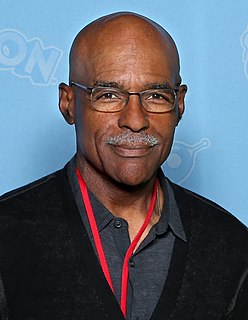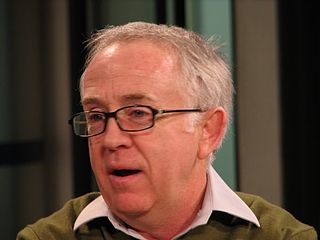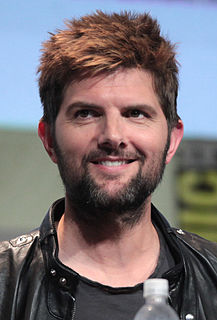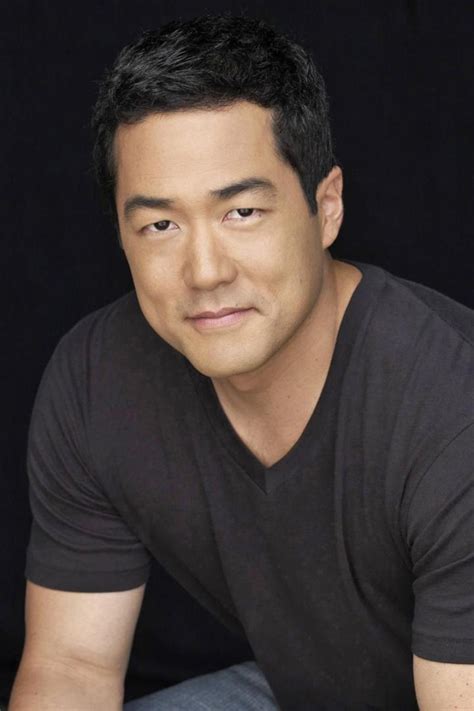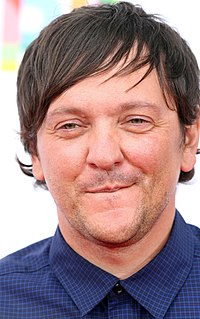A Quote by Michael Dorn
It was seriously just a name. They didn’t tell you what to do. They didn’t tell you how they wanted the character to be - nothing. You went in to audition for this character name and that was it. When I started, before I came onto the set, I went to Gene Roddenberry and said: hey, what do you want from this guy? Who is he? And being as smart as he is, he said: don’t listen to what you’ve heard or read or seen in the past, nothing. Just make the character your own. And that’s what I did.
Related Quotes
There was a point where I was making four movies a year. I was always on a set. I had no stories to tell. I was feeling empty. My life was just luggage and hotels and from set to set, from character to character. And one day, I said, 'And where is mine?' You know? And the moment I started to feel that fear, I stopped and I slowed down.
Stage is so important because it teaches me how to convey character with words - how to convey how a character reacts by the way they appear on stage. I can usually tell a playwright from someone who has never written for the stage. Did the character work? Did the dialogue reveal who the character is?
I don’t mind if the character is a small character, but I would just like her to have a journey in the film. Sometimes the characters are just there as a prop to further the man’s story. The great directors I’ve talked to, I’ve said listen, I don’t mind playing a woman that is a tiny part, but how does the story affect her? What can I play in the end that’s different from the beginning? Otherwise, it doesn’t make sense, because it’s just like being a prop.
Character: The ability to carry out a worthy decision after the emotion of making that decision has passed. Character simply stated is doing what you said you were going to do. If you develop a reputation for that, do you have any idea the effect that has on self-perception? Its immense, just immense. The Savior was a man of character. He did everything he said he was going to do.
But that's not the name of a man, it's the name of a mountain! (...) "It is my name," Athos said calmly. "But you said your name was d'Artagnan." "I?" "Yes, you." "That is to say, someone said to me: 'You are M. d'Artagnan?' I replied: 'You think so?' My guards shouted that they were sure of it. I did not want to vex them. Besides, I might have been mistaken.
I did more research into the police procedure. I worked out with SWAT guys and ex- and active military guys, and consulted with them and read books. As far as the character itself, I don't know how you can research being a focused guy, aside from just being a focused person and knowing what that's like. Outside of the character background and all that, there wasn't a whole lot of other stuff to really delve into. You just do what you do.
I started doing comedy just as myself, because I thought, "This is what's expected, you're meant to tell stories and do observations." And then I started to realize that I wanted to mix it up a bit, so I started to doing songs, and I had a little keyboard onstage and would bring in little props. Then I thought about the idea of talking about a character and becoming the character onstage. So, it sort of morphed into being stand-up that was more character based, and I found that's the stuff I got the better reaction from and was more exciting for me.
Within weeks of our premiere, it became obvious that Leonard [Nimoy] and the character of Spock were becoming something of a national phenomenon. ... And to be unflatteringly frank, it bugged me. ... [Then, Gene Roddenberry] said to me the wisest thing he could possibly have uttered. He said, `Don't ever fear having good and popular people around you, because they can only enhance your own performance. The more you can play to these people, the better the show.'
Once, during an interview in front of my wife, I was asked, "Are you one of those actors who brings your character home? Do you stay in character?" I said, "No, not really. I don't do that," and she started laughing. I asked her why. She said, "Well, you might think you don't bring characters home, but you do." So, while I don't feel like a character is lingering, it probably is.
